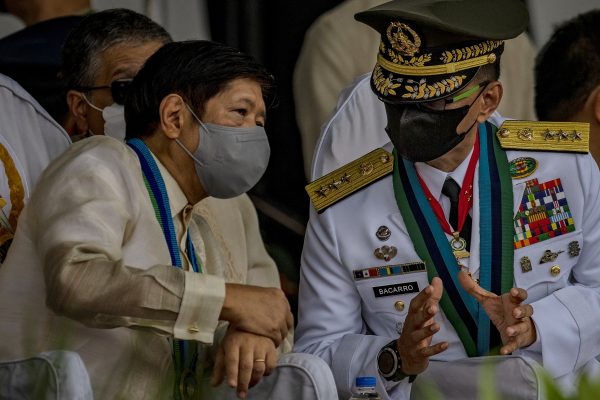It is a shortcut, given the long process of sanctioning erring members of the police that currently involves the PNP’s own Internal Affairs Service or the National Police Commission.
Under this scheme, officer resignations that have been found to have links to the drug trade will be accepted. Another committee will then be formed to recommend sanctions for these officers. The request for courtesy resignations may be an attempt to stage a credible crusade against corruption in the government. Yet in the face of long-standing issues of patronage and a lack of effective accountability mechanisms within the PNP, what is the value of this solution in addressing institutional problems?
Issues concerning the integrity of the PNP are not new. Under former president Ferdinand Marcos Sr, the Philippine Constabulary — the PNP’s militarised predecessor — committed countless acts of torture, summary execution and forced disappearances. After the fall of the martial law regime, efforts were made toward reforming the police force.
The 1987 Philippine Constitution was crafted to correct the mistakes made during the Marcos Sr dictatorship. It stressed the ‘civilian’ character of the police force, with the National Police Commission exercising control and possessing the power to discipline erring police. Yet, the problems persisted. Under former president Fidel Ramos, several members of the PNP were linked to organised crime. During Gloria Macapagal-Arroyo’s term, PNP officials were involved in numerous corruption scandals. Again, under Benigno Aquino, the police were associated with organised crime and illegal narcotics. More recently, the PNP was implicated in extra-judicial killings in Rodrigo Duterte’s war on drugs.
But despite the abuse and corruption perpetrated by the PNP, it still enjoys the trust of influential decisionmakers. The PNP still appears to be favoured in the 2022 national budget, receiving 190.69 billion pesos (US$3.45 billion) for its annual budget — higher than the Department of Health’s budget despite the country still reeling from the effects of the COVID-19 pandemic. With Duterte’s tough-on-crime approach, one cannot easily expect that Ferdinand ‘Bongbong’ Marcos Jr will be able or even willing to reverse his predecessor’s law enforcement policies overnight.
The PNP is a powerful institution, not only because of its law enforcement function, but also due to its historical role as an institution mobilised by the most powerful in government to wrest control over the population, most glaringly in local communities. Putting this institutional power into the larger context of patronage-driven politics in the country, the pursuit for accountability for police misconduct remains elusive. From causes like the ‘code of silence’ observed throughout the police hierarchy to its susceptibility to ‘political interventions’ from the outside owing to weak internal mechanisms, the PNP has serious integrity issues.
Top-down approaches do little to fix the long-standing problems of the PNP as an organisation. They may rid the PNP of top officials that have contributed to the problem. Yet, these measures, to which Abalos correctly referred to as ‘shortcuts’, do not address the deeply embedded culture of corruption and patronage. Indeed, it has been demonstrated that these kinds of solutions are ineffective. Rather, meaningful reforms require the overhaul of the organisation.
If Marcos Jr’s administration is serious in wanting to reform the ranks of the PNP, its priority should be the creation of a strong accountability mechanism within the organisation — preferably one that is independent, professionally trained, has ample resources and possesses oversight powers. The PNP currently has no such thing. While it has the Internal Affairs Service to deal with ‘all forms of misconduct in the police service’, its independence and effectiveness in holding police officers accountable has been called into question.
Several bills were filed in the last Congress to make Internal Affairs Service autonomous from the PNP and to give it more powers to impose measures against erring police officers. None have been passed. The Internal Affairs Service remains directly under the control of the PNP.
To incrementally earn the trust of the public in the proposed process to reform the ranks of the police force, the Marcos Jr administration must not only be transparent in its intentions but also be able to provide effective solutions. Mass resignations from the PNP’s top officials hardly qualify as an earnest effort at solving a lingering institutional problem.
Courtesy resignations may serve to shield perpetrators of misconduct in the ranks from accountability. It is also possible that the scheme will only help install people who are loyal to the present government leadership — in parallel with the game of ‘musical chairs’ played with the top brass of the Armed Forces of the Philippines.
As the public continues to hope for greater, sweeping institutional reforms of the police, much remains to be seen in the government’s actions. The question remains: if the PNP is here, as its motto claims, ‘to serve and protect’, to whom is service and protection owed?
Gemmo Fernandez is a Doctoral Candidate at the College of Law, The Australian National University.
Ruby Rosselle Tugade is Senior Lecturer at the University of the Philippines College of Law, University of the Philippines.

